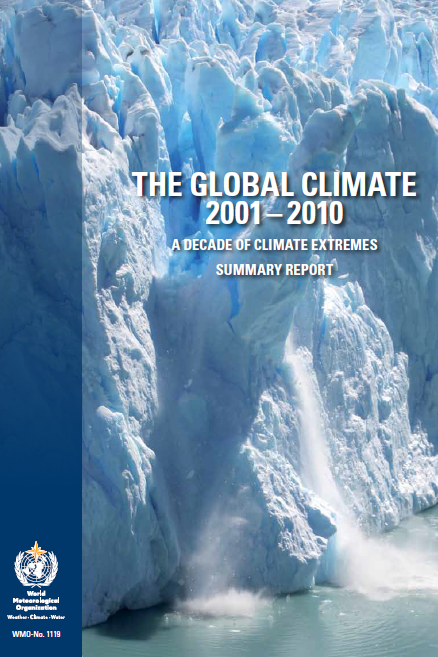
The global climate 2001 – 2010
A decade of climate extremes
SUMMAR Y REPORT
Foreword
The first decade of the 21st century was the warmest decade recorded since modern measurements began around 1850. It saw above-average precipitation, including one year – 2010 – that broke all previous records. It was also marked by dramatic climate and weather extremes such as the European heatwave of 2003, the 2010 floods in Pakistan, hurricane Katrina in the United States of America (USA), cyclone Nargis in Myanmar and long-term droughts in the Amazon Basin, Australia and East Africa. Many of these events and trends can be explained by the natural variability of the climate system. Rising atmospheric concentrations of greenhouse gases, however, are also affecting the climate. Detecting the respective roles being played by climate variability and humaninduced climate change is one of the key challenges facing researchers today. The World Meteorological Organization (WMO) is proud to be a major contributor to international efforts to better understand our climate. We sponsor or co-sponsor leading research and observation programmes, notably the WMO Global Atmosphere Watch, the World Climate Research Programme, the Global Climate Observing System and the Intergovernmental Panel on Climate Change. We also produce an annual statement – Status of the Global Climate – based on the WMO Climate System Monitoring network. This international collaboration facilitates the gathering of data from the world’s leading climate data, monitoring and research centres. These data, together with climate information collected through a unique survey among the world’s National Meteorological and Hydrological Services, were also used to produce the decadal report The Global Climate 2001–2010.
A decadal perspective makes it possible to assess trends and anticipate the future. It can also inform efforts to develop operational climate services that provide information and forecasts for decision-making in agriculture, health, disaster risk, water resources and other sectors. These efforts are being coordinated through the WMO-led Global Framework for Climate Services. To learn more about the 2001–2010 decade of extremes, including the detailed results of the WMO survey of countries, you are strongly encouraged to read the complete technical report (WMO-No. 1103), which is available online on the WMO website.
(M. Jarraud)
Secretary-General


































